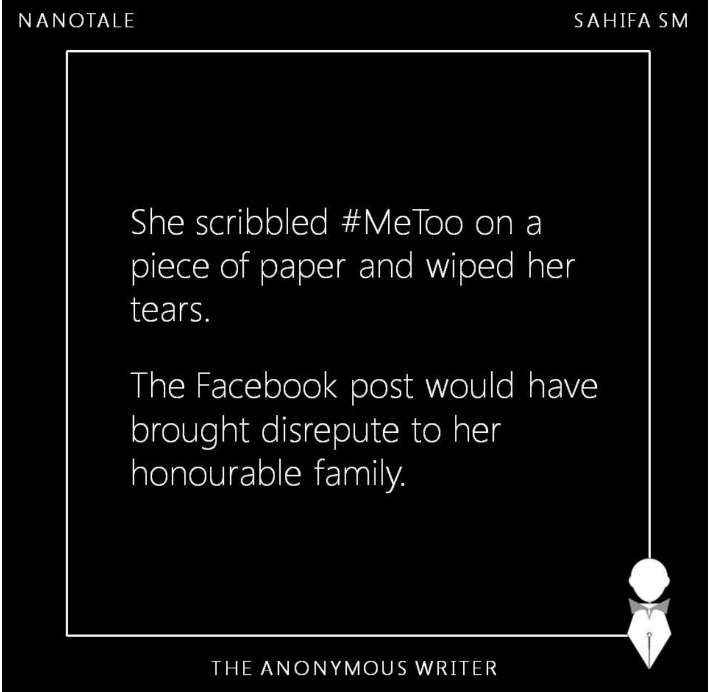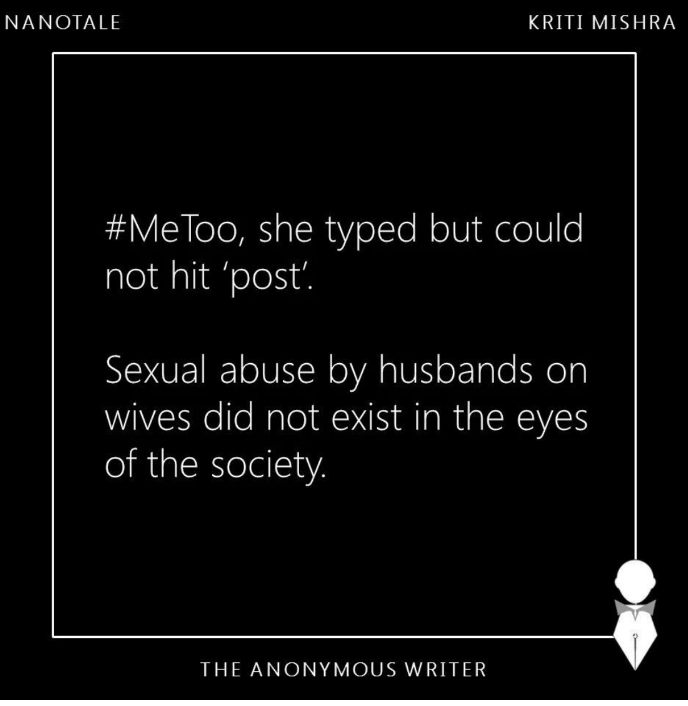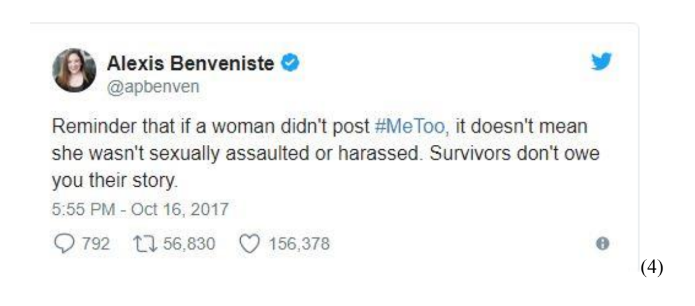In October 2017, a phrase called #MeToo buzzed around. Though the term was coined a decade earlier by an activist Tarana Burke to sensitize the talks around sexual assault (1), the term took over the internet recently in 2017. “#MeToo posts blew up all over Twitter
as actor Alyssa Milano encouraged women to share their personal stories of sexual harassment and more women accused US producer Harvey Weinstein of sexual assault and harassment (2).” The hashtag got extremely viral this time, probably because many of the
celebrities were endorsing it and posting stories with the hashtag. The campaign got a buzz not only on twitter, but also on other social media platforms, such as Facebook, Instagram etc. The campaign was about women who have suffered sexual abuse would come out and
post on social media with this hashtag. The internet was flooded with posts like these. Not only the celebrities, but normal people around you, were also found to be posting statuses with this hashtag. “Twitter reported that the hashtag was shared nearly a million times in 48 hours. On Facebook, the comments and reactions totaled more than 12m in 24 hours (2).”
While surfing the internet, I found two stories on a page called The Anonymous Writer on Facebook which are mentioned as follows:
 As I read these stories amongst other stories which were of the sexual abuse victims, I kept wondering what about the voices that are left out of the larger narrative. This is what I plan to look at in the article: The voices of the people who do not or can’t be part of such hashtag
As I read these stories amongst other stories which were of the sexual abuse victims, I kept wondering what about the voices that are left out of the larger narrative. This is what I plan to look at in the article: The voices of the people who do not or can’t be part of such hashtag
activism. Is there a real connection to the mental health of the victims or the hashtag posts are just for the sake of number display? One of the twitter uses also posted the following in regard to the question:
How then do we understand the relation between the experience and the presence or absence of a post about that experience? Those are few of the questions that I will be dealing with in this article.
There are varying opinions on the subject. One author mentions “The power of #MeToo, though, is that it takes something that women had long kept quiet about and transforms it into a movement. Unlike many kinds of social-media activism, it isn’t a call to action or the beginning of a campaign, culminating in a series of protests and speeches and events. It’s simply an attempt to get people to understand the prevalence of sexual harassment and assault in society. To get women, and men, to raise their hands (4).” Another thinker mentions “The problem, really, with all of it is how violently present the victim is forced to be in the narrative, and how utterly passive the perpetrator. The problem is not that women have trouble considering themselves victims of sexual violence, but that men have trouble considering themselves the aggressor (5).” With these conflicting views, it becomes even more important to study this process of hashtag activism.
Hashtag activism does create a stir around things in digital media. It spreads awareness about a cause. “Michael Flood, in a particularly biting blog post titled “Is Raising Awareness Enough?”, compares hashtag activism to taking part in a protest march. It’s an activity, organizations have been using for years to share with the world their commitment to their cause — and make sure that governmental organizations know it, too (6).” “Critics of digital activism refer to the trend as “slacktivism” or “clicktivism” arguing that online support isn’t backed by real-life actions. Howard refutes this claim, saying small acts of support are just as important (7).”
“Evgeny Morozov perfectly encapsulates the controversy in a Foreign Policy article:
“‘Slacktivism’ is the ideal type of activism for a lazy generation: why bother with sit-ins and the risk of arrest, police brutality, or torture if one can be as loud campaigning in the virtual space? Given the media’s fixation on all things digital — from blogging to social networking to Twitter — every click of your mouse is almost guaranteed to receive immediate media attention, as long as it’s geared towards the noble causes. That media attention doesn’t always translate into campaign effectiveness is only of secondary importance (6).”” “Howard says he believes that nothing will replace in-person protests or demonstrations but digital activism is an effective way to get people engaged in a dialogue about the issues. For many, hashtag activism is a good place to start (7).”
Hashtag activism, specially the #MeToo campaign comes up with its own complexities. The campaign does spread an awareness about sexual abuse; it also makes the survivor feel a certain kind of solidarity that there are people who share the similar kind of experience and the survivor can maybe open up and talk to these other people. But as I have shown earlier, what about the people who can’t speak about it? Or the people who probably have made peace with the incident? Do they need to necessarily be a part of the campaign? The survivors don’t owe their experience to a campaign. Simply asking women to write #MeToo on social media removes the complexities from the problem. How is a person to own their sexual abuse to so many people, if they have not even accepted it to themselves? Thus, hashtag activism is very privileged way of protesting. It may provide people with numbers, but it does not go into the details of the struggle or any way through which the
people suffering from it can be helped.
No everyone chooses to voice their opinion or share their experience with the world for various reasons. There is a possibility that the people who do not speak online, are making a difference in real life. “What began, in that case, as a well-intentioned encouragement to do away with personal shame around your diagnosis, transformed eventually into a slick and meaningless catchphrase that puts the burden on the sufferers to heal themselves without any resources (5).” Hashtag activism does not take this into account.
Thus, I would conclude by saying that, Hashtag activism is great to provide numbers and support ‘virtually’, but it can’t match up to the real protests and real warmth of listening to the survivors’ stories.
References
1. https://www.democracynow.org/2017/10/17/meet_tarana_burke_the_activist_who
2. https://www.theguardian.com/lifeandstyle/2017/oct/28/metoo-hashtag-sexual-harassment-violence-challenge-campaign-women-men
3. https://www.facebook.com/TheAnonymousWriter/
4. https://www.theatlantic.com/entertainment/archive/2017/10/the-movement-of-metoo/542979/
5. https://www.vice.com/en/article/43akqp/the-problem-with-the-metoo-campaign
6. http://www.makeuseof.com/tag/hashtag-activism-powerful-pointless/
7. http://college.usatoday.com/2015/10/26/hashtag-activism/





Recent Comments